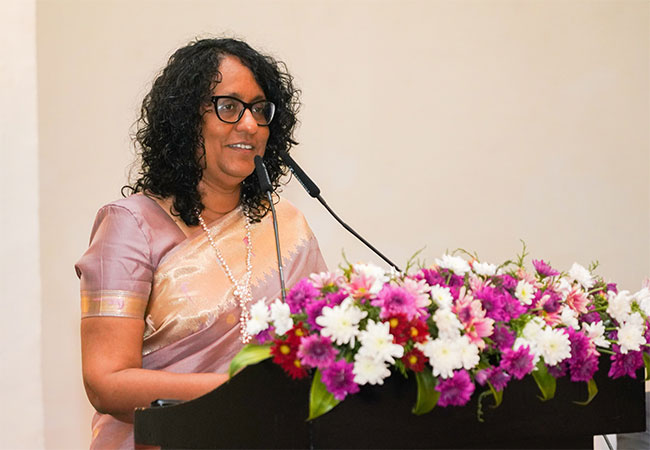

The government is moving away from an exam-centric education system towards a modular system focused on active learning, with the aim of providing quality education for all children, Education Minister Dr. Harini Amarasuriya said.
Speaking during a media briefing held at the Ministry of Education to outline the new education reforms set to be implemented from 2026, the Minister noted that Sri Lanka’s traditional approach to education where students, teachers, and parents primarily prepare for examinations is set to change.
“In the modular system, children engage in various learning activities and are continuously assessed, rather than preparing solely for one final exam,†she explained.
Also present at the discussion were Education Ministry Secretary Nalaka Kaluwewa and National Institute of Education Deputy Director General Dr. Ashoka de Silva, who briefed journalists from all major media outlets on the upcoming reforms.
According to the officials, the new syllabus will result in a restructured GCE Ordinary Level (O/L) examination, which will be introduced in 2029. The modular system will be introduced gradually, starting with Grades 1 and 6 from 2026.
“We have three years to observe the system and adjust based on practical challenges. These reforms are not final; we welcome feedback and suggestions,†Secretary Kaluwewa said.
One key reform is the reduction of classroom sizes. “Ideally, there should be only 25–30 students per class. At present, many classrooms have over 40 students due to political admissions,†the Secretary said, adding that the government has now put a stop to admitting students beyond the prescribed limit.
Addressing concerns about the Grade 5 scholarship examination, the Secretary clarified that no decision has been made to abolish it. “To do that, we must first eliminate the disparity between schools, which is not something we can achieve overnight. However, we aim to reduce the undue pressure this exam puts on children.â€
Minister Dr. Amarasuriya also said that under the reforms, the Education Ministry will take responsibility for monitoring early childhood development centers and the training of teachers in those institutions.
Deputy Education Minister Madura Seneviratne added that teacher training is a priority. “Of the five pillars in our reform agenda, teacher training is key. A program to begin training teacher trainers will start in August,†he said.
The Ministry also plans to hold a series of meetings with university lecturers, teacher unions, and education stakeholders to ensure broad awareness and collaboration on the proposed reforms.
In a bid to boost tourism and improve long-distance travel convenience, the Railways Department announced…
The research unit of the Civil Aviation Authority of Sri Lanka (CAASL) is preparing to…
About 55 per cent of India’s merchandise exports to the United States will be subject…
President Anura Kumara Dissanayake has chaired a meeting this morning (11) at the Presidential Secretariat…
An individual has been arrested by officers of the Criminal Investigation Department (CID) at the…
A total of 1,408,335 tourists have arrived in Sri Lanka so far this year, marking…